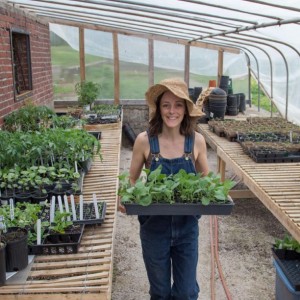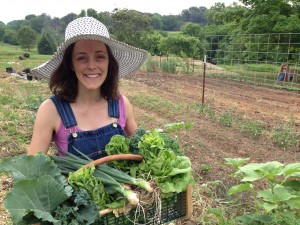From Loaf to Farm: A Bread Loaf-Inspired Market Garden
0September 13, 2015 by Tom McKenna

by Jessica Dean
Adjunct English Instructor and Writing Tutor
Pellissippi State Community College, Knoxville, TN
The word halo has agricultural origins. The Greek meaning traces back to the threshing floor, tread into a circular shape by oxen or other animals threshing grains. Clay Halo Farm & Kitchen, my urban garden project, exists to grow and gather. The farm exists to help restore food access in east Knoxville by educating the next generation of farmers in the arts of growing produce to sell at market and creating meals to gather students around a dignified communal dining experience.
In 2011, I drove from North Carolina to New Mexico to begin my graduate degree at Bread Loaf. My dream was to become a teacher, farmer, and writer. Several people told me I should meet with John Elder. The following summer, my first on the mountain, John and I met in the barn. John graciously offered book recommendations, and, perhaps most importantly, affirmation that my dream sounded like it could happen (Bread Loaf teachers excel at this particular skill!). This summer I left the mountain with diploma and cane in hand and returned to Knoxville, Tennessee, to teach writing at a community college and grow food on a piece of urban land.

Pellissippi State students form rows in the high tunnel at CUA. The rows are used by market gardeners to grow fresh produce for the neighborhood.
Pellissippi State Community College has five campuses in Knoxville. I teach at the Magnolia Avenue Campus, a small site in the building formerly occupied by Knoxville Catholic High School, a building where Cormac McCarthy once walked the halls as a student. The Magnolia Avenue Campus is in a marginalized area of our city. We do not have a cafeteria. This neighborhood, where I live, teach, and farm, is a food desert.
My market garden exists on land granted to me by the Center of Urban Agriculture (CUA) at the Knoxville Botanical Gardens. This nonprofit grants small plots to individuals, medium-sized plots to Burundi refugees (Knoxville is an official resettlement city.), and large market-garden plots to several local low-income farmers, like myself, desiring to flex our green thumbs, incubate our businesses, and incubate our business models. Through Pellissippi State’s “Good Food For All” initiative and service learning programs, current students and faculty volunteer at the CUA. I have the opportunity to talk to the students and show them my work. Additionally, I have one paid intern who attends Pellissippi State. Once we have enough food in production and a commercial kitchen to work from, we plan to cater one hot meal per week to the school. Clay Halo Farm accepts SNAP/EBT benefits and, hopefully, will be able to operate a farm stand in the neighborhood near the school to provide a source for fresh, naturally grown vegetables.
Bread Loaf exemplifies the power that exists in a community of learning. Each summer, students live, eat, sleep, and breathe air steeped in words written and thought, kept and shared. Students draw from these experiences and import them to their local classrooms. Community college, at its best, through the power of education, exemplifies a locally rooted agent for empowerment and change. Through partnerships with national and local organizations and commitment to creative, community-based initiatives, I have found a place at an institution of learning to affect change locally. Bread Loaf equipped and encouraged me to do this work. I look forward to partnering with BLTN food literacy initiatives and expanding Bread Loaf’s presence in community colleges across the country through the newly formed BL2YN, Bread Loaf Two-Year Network. If anyone ever ventures through east Tennessee, come visit!
Category BLTN Teachers, Fall 2015, Issue | Tags:




Leave a Reply